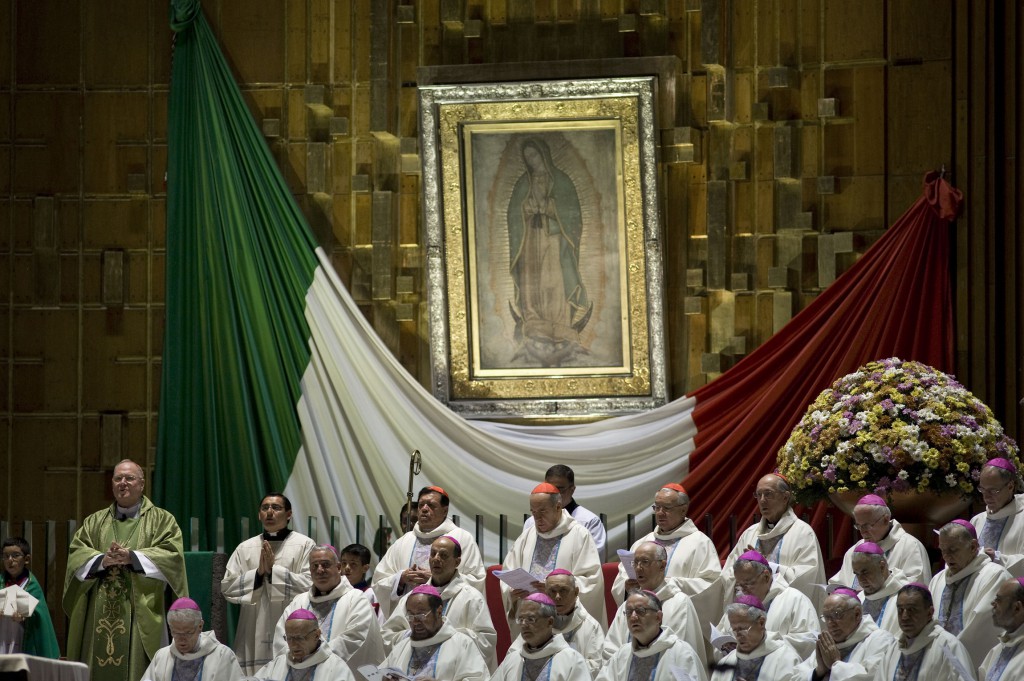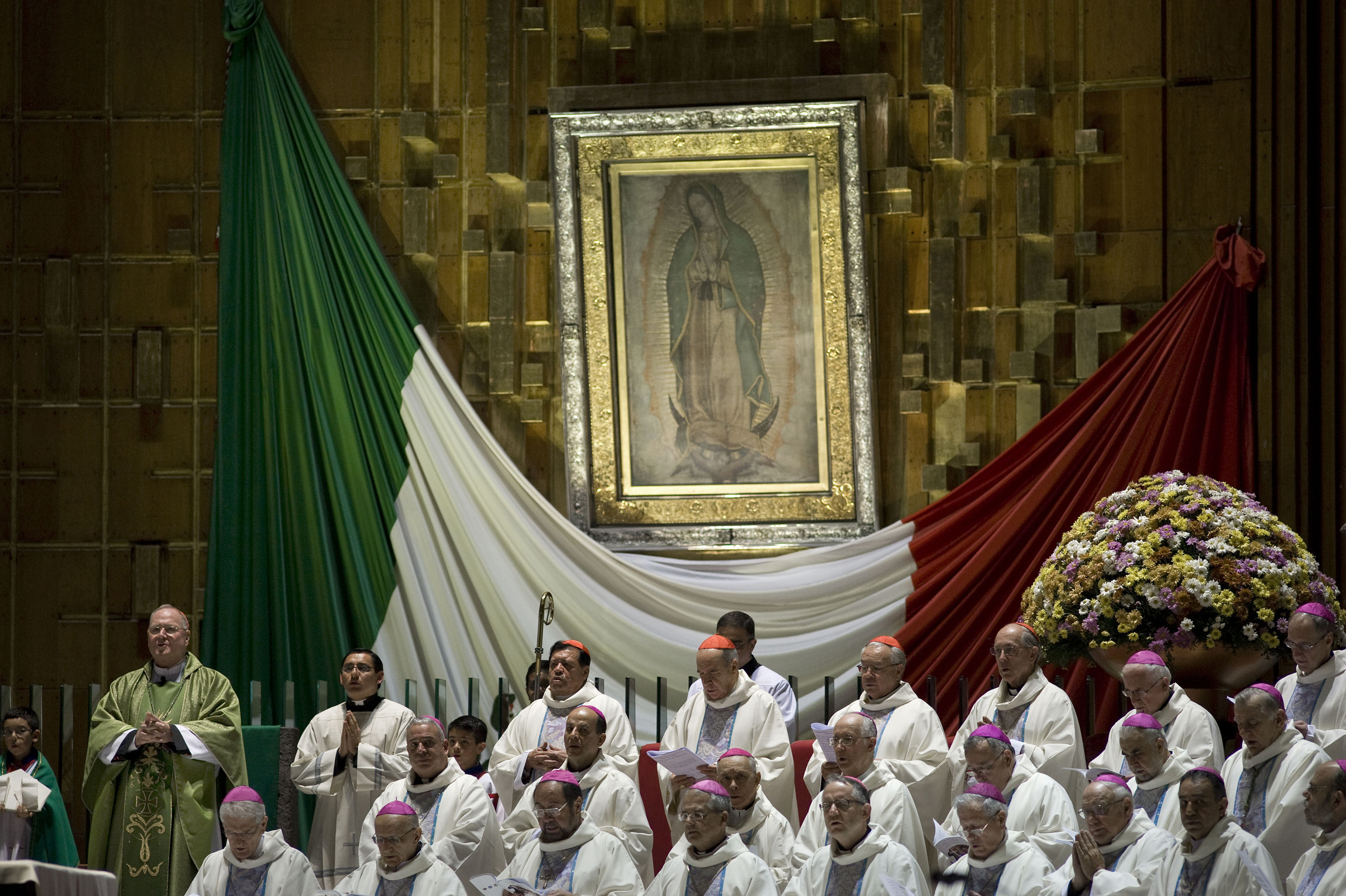
MEXICO CITY (CNS) — Pope Francis once again called for Catholics to adopt a missionary mindset and make mission the priority of all pastoral activities.
The pope, speaking from the Vatican via video to an audience of clergy, religious and laity at the Basilica of Our Lady of Guadalupe in Mexico City, also called for participants to cast aside clericalism and to get out of their churches to serve people where they are.
“It’s vital for the church to not shut itself off, not feel satisfied with what it already has achieved,” Pope Francis said Nov. 15 in pre-recorded comments to the conference on the “new evangelization” of the Americas.
“If this happens, the church becomes ill, it becomes ill from imaginary abundance, from superfluous abundance, it impedes itself and is weakened,” he said.
Pope Francis has made previous pleas for Catholics to embrace missions in their everyday lives and to go meet people where they are. He spoke about this twice in Aparecida, Brazil: during the general meeting of the Latin American bishops in 2007 and when he traveled, as pope, to Brazil for World Youth Day in July.
The mission mandate has had its focus on a region rich in Catholic history: the New World. And it comes as the church is attempting to regain relevance on continents largely converted to Catholicism centuries earlier by the conquering Europeans, but where evangelical groups have gained ground and millions more consider themselves cultural Catholics or only Catholics in name.
“Aparecida proposes putting the church in a permanent state of mission,” said Pope Francis, the first pontiff from the Americas. It also proposes “carrying out acts of a missionary nature, but in the larger context of a generalized missionary style: that all normal activity of individual churches has a missionary character.”
Church leaders in Latin America say renewal is constantly carried out and that missions were discussed by the Second Vatican Council and Blessed John Paul II’s 1999 apostolic exhortation, “Ecclesia in America.”
But with vices such as inequality still rife and many people falling way from the church, the call for a new evangelization is timely.
“We’ve felt that it is necessary for there to be deepening of the faith of those belonging to the Catholic Church,” said Cardinal Raul Vela Chiriboga, archbishop emeritus of Quito, Ecuador.
The Nov. 16-19 conference at the Basilica of Our Lady of Guadalupe, with an estimated 80 bishops in attendance, was an attempt to better define the church’s missionary role. That starts with defining an oft-misunderstood word: mission — not to be confused with “proselytizing.”
“We don’t do proselytism. Proselytism is a manipulation,” said Father Manuel Rodriguez, Redemptorist provincial for Puerto Rico and Dominican Republic. “What we do is give the witness of Jesus Christ.”
The conference and pilgrimage were held at the world’s most visited Marian shrine, where Our Lady of Guadalupe appeared to St. Juan Diego in 1531. The apparition allowed for an early evangelization throughout the Americas, where Mary is often accepted in an acculturated way and still honored by millions.
“It should come as no surprise that we see our Holy Father’s pastoral approach (for the Americas) as a reflection of Our Lady of Guadalupe’s message,” said Carl Anderson, supreme knight of the Knights of Columbus.
Conference participants noted the church faces many challenges in its missionary work.
Pope Francis cited “the temptation of clericalism,” which “does damage in Latin America” and prevents the proper formation of maturity and “Christian responsibility” among the laity.
“The attitude of the true pastor is not one of a prince or a mere functionary, primarily paying attention to discipline, regulations or organizational mechanisms,” Pope Francis said. “This always leads to a pastor distant from the people, unable to bring about or achieve a true encounter with Jesus Christ.”
The church also confronts violence, especially in Mexico and Central America. To fight this, Mexican dioceses say they are emphasizing catechism classes and the better training of laity, and some parishes are providing special pastoral attention to victims of violence, said Archbishop Carlos Garfias Merlos of Acapulco, Mexico.
Latin America’s youthful demographics also draw attention.
“The (youthfulness) of Latin America almost forces future-looking perspective, and that means missionary,” said Archbishop Thomas G. Wenski of Miami.
“The church in Latin America is a young church … half the population (in some countries) is under age 25. That’s certainly not true of Europe,” he added.
Evangelical congregations also have increased, drawing Catholics. The Pew Forum on Religion and Public Life says 39 percent of the world’s Catholics live in Latin America, but just 72 percent on the region’s population professed the Catholic faith in 2010.
Father Rodriguez expressed some skepticism of the expansion of evangelicals, saying many people he encountered were “church shopping” and ending up unsatisfied and falling away from any form of Christianity.
Some in the church say they seeing are seeing positive signals of a possible revival since the election of Pope Francis.
While acknowledging a lack of solid statistics, Guzman Carriquiry, secretary of the Pontifical Commission for Latin America, reported more people coming to churches with questions about Catholicism, requesting sacraments such as confession and even participating in pilgrimages to Marian shrines.
“There are series of signals that allow us to say that this Catholic resurgence on the continental level is something our conference wants to accompany and encourage,” said Carriquiry, a Uruguayan working at the Vatican.
World Youth Day in Brazil was another encouraging sign for church leaders.
“It roused a sense of leadership in young people and … not-so-young people, too,” said Archbishop Orani Tempesta of Rio de Janeiro.
Father Rodriguez said Pope Francis’ style has been important in attracting people, especially his use of gestures and his nonjudgmental language.
“They’re rediscovering Jesus, reflected in Pope Francis. … the way he approaches sick people, the way he answers letters, his simple lifestyle. It’s being like Jesus,” Father Rodriguez said.
“If this is Catholicism, rather than just being against things, (people say,) ‘Maybe I should look into this,'” Father Rodriguez said.
— By David Agren, Catholic News Service.






